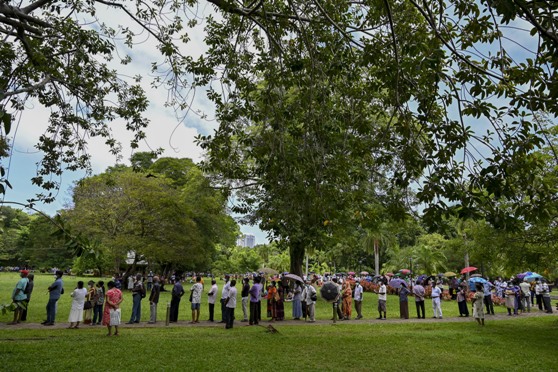COVID-19: Facing the shifting policy priorities

By Shashika Bandara
S
ri Lanka is emerging from another wave of COVID-19 and there is a sense of uncertainty that surrounds us. While Sri Lanka’s success of vaccinating its population at record speed with 50% of the adult population vaccinated by September 18, 2021, has been notable, it has also given rise to sentiments of vaccine euphoria of which countries have been repeatedly warned against. The absence of a phased re-opening, lack of clear instructions to access essential and non-essential services were major missteps emerging from the last wave.
The country may again be heading in the same direction. Adding to the chaos is the rising cost of essential items, the increasing economic vulnerability of poor communities and of course the impending threat of another variant or a wave. Additionally, drawing a surprising parallel to high-income countries, the youth of the country has shown vaccine hesitancy and vaccine brand selectivity. Thus, Sri Lanka unfortunately is facing a crisis of competing policy priorities.
A key exercise that can help us ground ourselves both as policymakers and as a community is to understand what we can do to regain a level of normalcy while minimizing risk and to understand what we should not do.
In terms of steps that we can take, some lessons are already there for us to learn from previous missteps. The rush to reopen, allowing of indoor non-essential events that led to a false sense of security and a spike in cases should not be repeated. Instead, the government needs to take a phased reopening approach, ideally integrating a vaccine pass.
A vaccine pass to places such as restaurants or shops once the majority of the country is fully vaccinated can also act as an incentive for the youth to get vaccinated. However, the current misinformation on vaccines, which are at times perpetrated by global pop-icons, need a stronger reaction than merely asking the youth to get vaccinated. One approach can be to address the fears and concerns of the youth and making such services prominent and readily available for everyone to access. Another would be to make them a clear stakeholder in the fight against the pandemic by indicating how vaccinations will have a positive ripple effect that can help the vulnerable and therefore getting vaccinated is a public service.
A crucial misstep that many of the high-income countries took was to regard vaccines as a silver bullet against the pandemic. Therefore, since we have the luxury to learn from the mistakes of others, we should be cognizant that vaccines alone cannot defeat the pandemic. Practicing and communicating the importance of masking, distancing and disinfecting will continue to be crucial.
Recognizing what we should not do is perhaps the easier of the two.
We should be aware and not fall prey to latent waves of misinformation that perhaps might have taken longer to enter the national conversation. One such example is the Great Barrington Declaration that informed the Trump era pandemic policy approaches and cost thousands of lives and has had a global impact. In April 2021, YouTube removed a roundtable discussion headed by Governor Ron DeSantis of Florida that promoted the Great Barrington Declaration and erroneous claims of lack of efficacy of masking. The Declaration, which has come under fire from the public health community for its erroneous science and for its questionable funding and strategy at its core, remains a threat to public health security. Therefore, one of the key elements of our response should be to be aware of such threats and to not cherry-pick information that can support an easier way forward, which can result in costing lives.
Another is to avoid breeding mistrust against the scientific community. The evolving nature of the science, especially during a pandemic, makes the scientific community an easy target. Such attacks that cast doubt on science can provide a short-term respite but will result in long-term negative impacts on health security. One example is the recent case of the World Health Organization (WHO) of Sri Lanka removing a report from a credible independent panel of scientists on COVID-19 measures at the request of the government. While the challenge was WHO being misquoted as the author, which can be corrected via a statement or disclaimer, the entire document has been removed from the site. Actions such as these damage the credibility of scientists and cast doubt on the independence of credible information sharing by global organizations.
The third is to not be rigid in our policy approaches. For example, the changing number of cases, the evolving policy approaches and understanding of the endemicity of the virus should be considered for Sri Lanka’s way forward. This includes understanding and communicating the need for differing levels of public health restrictions based on case levels and mortality rates. It also includes preparing for the future challenges of waning immunity via necessary procurement and fund allocation.
The months ahead will be filled with many crucial competing policy priorities for Sri Lanka in the backdrop of an evolving pandemic that requires realistic and informed analyses. In preparation, a useful standard that we should strive towards is increased collaborative synergy between scientists, healthcare workers, policy experts, civil society organizations, global organizations and the government. Fractured approaches and political maneuvering at this crucial juncture will weaken our institutions and demoralize our communities.
– Shashika Bandara is a former Policy Associate at the Centre for Policy Impact at the Duke Global Health Institute and currently a doctoral candidate focusing on global health policy at McGill University. He tweets at @ShashikaLB. This article was originally featured on groundviews.org

